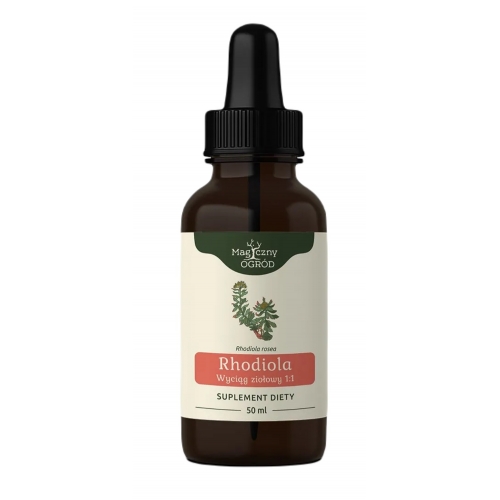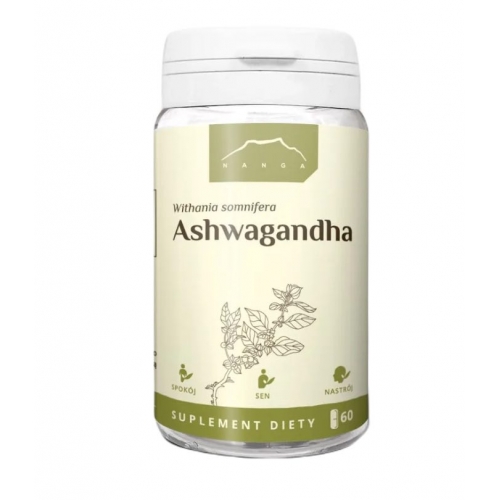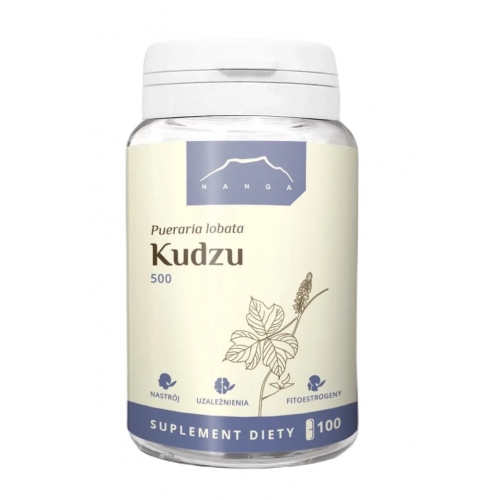Natural energizing plants without caffeine - how do they work and what is the difference between different plants?

Before I start, an important note - before we start using energizing plants with or without caffeine, we should consider whether the fatigue has been with us every day for a long time. Have we wanted to sleep all day for several weeks or months and find it difficult to focus on work? If so, you should consider getting your thyroid checked because when your thyroid fails, your entire metabolism slows down and your energy levels drop significantly. There can also be the so-called brain fog - impaired thinking and concentration. Balancing thyroid hormone levels may take some time, but it restores energy and cognitive function.
The other problem that can cause fatigue and weakness in the body is anemia and this also needs to be checked through tests. Not only the number of red blood cells is important, but also the level of ferritin in the body, i.e. the iron reserves. Iron is necessary for the production of healthy red blood cells, whose role is to transport oxygen. If one or the other is missing, the body cannot effectively use the oxygen we breathe. Oxygen is involved in the production of energy in all the cells of our body (this process is called cellular respiration), so its reduced use will cause chronic fatigue.
Let's move on to decaffeinated plants. There are several of them. The strongest are Russian root and Tyrosine, which is not a plant. Rose root and Catuaba are moderately but clearly energizing. Kudzu on the other hand, provides less energy, rather intended for sensitive people.
Natural energizing plants without caffeine:
L-tyrosine
Russian root (Siberian ginseng)
The prickly eleutherococcus – Eleutherococcus senticosus – is not related to the Korean ginseng but it has very similar effects and is just as energizing! It comes from Siberia, and its main active compounds are eleutherosides. Eleutherococcus increases physical and intellectual performance. It is good for training and playing sports, as well as for intellectual and creative work. Good mood and willingness to act increases because this ginseng, like Panax, also increases the level of happiness hormones. Russian root is used in capsules, tincture and in cut and ground form. The tincture absorbs and takes effect most quickly, especially when taken directly under the tongue.
L-tyrosine
This is the only non-herbal substance among the energizing plants listed in this article. But it is still natural :) Tyrosine is an amino acid that builds proteins, so it occurs in our body and in other living organisms. It not only produces proteins, but also dopamine and thyroid hormones. This is why tyrosine is a good energizing agent. An increased availability of tyrosine in the form of a supplement helps to increase the production of dopamine in our brain, which is a neurotransmitter that determines energy levels, motivation, self-discipline, mood, concentration and libido. Therefore, a higher level of dopamine gives you a good kick! The effect of tyrosine on the thyroid gland is also important - this organ is responsible for proper metabolism, and when it receives additional support, the metabolism goes faster, which also gives us more energy. Tyrosine is used in a powder that dissolves easily in water and is almost tasteless. 2 measures of tyrosine, i.e. 400 mg, (God forbid in combination with coffee) is a guarantee for a productive day.
Catuaba
It is one of the Brazilian love plants, mainly associated with a positive effect on libido. But it is worth knowing that it also has a significant effect on the mind - it refreshes the head and sharpens concentration. In addition, it stimulates the body somewhat and raises the mood. Doesn't that sound like the perfect start to the day? The raw material obtained from catuaba is bark. The cut bark is used to prepare tea and tincture, and the ground bark is used orally.
Rose root (Rhodiola)
Also called Rhodiola rosea, it is a thick-leaved plant that comes from Siberia, but is also found in the Alps. It only grows high up in the mountains. Its root is called the "golden root" by the locals because of its great value and healing properties. Rhodiola supports the body on many levels: it stimulates and increases physical performance, improves intellectual abilities and memory, relieves stress, elevates mood and strengthens immunity. Therefore, it is an adaptogen. It is worth taking advantage of its properties, especially during prolonged mental work. Rose root is available in different forms: capsules, tincture and ground root.
Kudzu
This is the other plant with a mild energizing effect. It comes from China and has been used in traditional Chinese medicine for years. Already in the 11th century AD. it was served to people suffering from alcoholism. Studies have shown that kudzu reduces the desire to drink alcohol, but the exact mechanisms of this effect have not yet been explained. One of the supposed methe mechanisms are that kudzu inhibits the breakdown of serotonin and dopamine in the brain, which leads to a stabilization of mood and a reduction in the desire to use stimulants. The same mechanism would also explain the small stimulating effect of this plant, as well as its positive effect on thinking and concentration. I want to point out that not everyone will feel stimulated by kudzu, in my opinion only people who are sensitive to various substances. Let me know in the comments if it works for you :)
Food supplements that improve the effect of energy-giving plants
Finally, another interesting fact - you can enhance the effect of energizing plants by using plants or compounds that do not have a stimulating effect in themselves, but act synergistically with energizing plants, strengthen their effect or support the body's energy metabolism. I included four supplements in this group: ashwagandha, vitamin B complex, taurine, and magnesium malate.
Ashwagandha
It is a phenomenal plant that works a little differently in the morning than in the evening. In the evening it helps you relax and helps you fall asleep, but in the morning it can stimulate you, which is why it is sometimes called Indian ginseng. However, in my opinion, its stimulating effect is not as strong as in the case of classic ginseng. Try using Ashwagandha together with Russian root or another energizing plant. The effect can be amazing!
B complex
B vitamins are necessary for the body to function well. They participate in metabolic processes and affect energy production. Their deficiency results in a decrease in the efficiency of energy production in the body's cells, which can be particularly serious in people with thyroid diseases. Pay attention to the doses of vitamins in the dietary supplements you buy, as well as unnecessary fillers and additives. There are capsules available on the market without the addition of modified starch or cellulose, talc, titanium dioxide, polydextrose, iron oxide (and many others...), as well as B complex in liquid form, which is easily absorbed.
Magnesium malate
This is a very interesting, organic form of magnesium. There are several of them: citrate, lactate, taurate and magnesium glycinate. Each provides easily absorbable magnesium and also has specific effects. Of all these forms, magnesium malate has the most beneficial effect on metabolism, since the substance released from magnesium malate participates in the Krebs cycle, that is, in the production of energy by the body's cells.
Taurine
It is an amino acid that does not make proteins. However, it plays other important roles in our body. It is not without reason that taurine is usually added to energy drinks – it perfectly complements the stimulating effect caused by caffeine and other energizing substances. It reduces mental fatigue and promotes concentration and thought processes. In addition, it prevents anxiety and stress as a result of taking a high dose of caffeine.
References:
1. Eleutherococcus senticosus. https://examine.com/supplements/eleutherococcus-senticosus/
2. L-Tyrosine. https://examine.com/supplements/l-tyrosine/
3. Catuaba. https://www.rain-tree.com/catuaba.htm
4. Rhodiola rosea. https://examine.com/supplements/rhodiola-rosea/
5. Ashwagandha.https://examine.com/supplements/ashwagandha/
6. Evaluation of di‐magnesium malate. https://www.ncbi.nlm.nih.gov/pmc/articles/PMC7009340/
7. Taurine.https://www.drugs.com/npp/taurine.html






Leave a comment